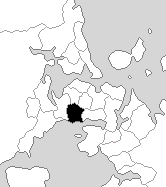Related Research Articles

The 1919 New Zealand general election was held on Tuesday, 16 December in the Māori electorates and on Wednesday, 17 December in the general electorates to elect a total of 80 MPs to the 20th session of the New Zealand Parliament. A total number of 560,673 (80.5%) voters turned out to vote.

Auckland Central is a New Zealand electoral division returning one member to the New Zealand House of Representatives. The electorate is currently represented by Chlöe Swarbrick, a member of the Green Party; she has represented the seat since 2020.
Auckland East was a New Zealand electorate, situated in the east of Auckland. It existed between 1861 and 1887, and again between 1905 and 1946.

Napier is a New Zealand parliamentary electorate, returning one Member of Parliament to the House of Representatives. It is named after the city of Napier, the main urban area within the electorate. The electorate was established for the 1861 election and has existed since. Since the 2014 general election, Napier has been held by Stuart Nash of the New Zealand Labour Party. Previously, it had been held by Chris Tremain of the New Zealand National Party, who stood down prior to the 2014 election.

Rotorua is a New Zealand parliamentary electorate, returning one Member of Parliament to the New Zealand House of Representatives. It was first established in 1919, and has existed continuously since 1954. The current MP for Rotorua is Todd McClay of the National Party, who won the electorate in the 2008 general election from incumbent Labour MP Steve Chadwick.
Hamilton is a former New Zealand parliamentary electorate that existed from 1922 to 1969. The electorate covered the urban area of the city of Hamilton. In 1969, the city was part of two rural electorates, Hamilton East and Waikato. For the 1972 election, the nature of Hamilton East changed to urban, and the Hamilton West electorate complements it to form a second urban electorate.
Raglan is a former New Zealand parliamentary electorate. It existed for three periods between 1861 and 1996 and during that time, it was represented by 13 Members of Parliament.
Franklin was a rural New Zealand parliamentary electorate. It existed from 1861 to 1996 during four periods.
Gisborne is a former New Zealand parliamentary electorate. It existed from 1908 to 1996, and it was represented by 12 Members of Parliament.
Waitemata was a New Zealand parliamentary electorate, from 1871 to 1946, and then from 1954 to 1978. It was represented by 18 members of parliament.
Manukau is a former New Zealand parliamentary electorate in the south Auckland Region. It existed from 1881 to 1978, with a break from 1938 to 1954. It was represented by nine Members of Parliament. Two by-elections were held in the electorate.
Awarua was a New Zealand parliamentary electorate from 1881 to 1996.
Hutt was a New Zealand parliamentary electorate. It was one of the original electorates in 1853 and existed during two periods until 1978. It was represented by 13 Members of Parliament.
The former New Zealand parliamentary electorate on the western inner city of Auckland, was known as City of Auckland West from 1861 to 1890, and then Auckland West from 1905 to 1946.

Roskill was a New Zealand parliamentary electorate, from 1919 to 1996. The electorate was represented by eight Members of Parliament.
Kaipara is a former New Zealand parliamentary electorate north of Auckland that existed from 1902 to 1946, and from 1978 to 1996.
Hurunui was a parliamentary electorate in the Canterbury region of New Zealand, from 1902 to 1963.
Waipawa was a parliamentary electorate in the Hawke's Bay Region of New Zealand, from 1881 to 1946.
Ponsonby was a parliamentary electorate in Auckland, New Zealand from 1887 to 1890 and from 1946 to 1963. The Ponsonby electorate was represented by two Members of Parliament.
Oamaru was a parliamentary electorate in the Otago region of New Zealand, during three periods between 1866 and 1978.
References
- Hislop, J. (1923). The General Election, 1922. Government Printer. Retrieved 20 November 2014.
- Gustafson, Barry (1980). Labour's path to political independence: The Origins and Establishment of the New Zealand Labour Party, 1900–19. Auckland, New Zealand: Auckland University Press. ISBN 0-19-647986-X.
- McRobie, Alan (1989). Electoral Atlas of New Zealand. Wellington: GP Books. ISBN 0-477-01384-8.
- Norton, Clifford (1988). New Zealand parliamentary election results, 1946–1987. Wellington: Victoria University of Wellington Department of Political Science. ISBN 0-475-11200-8.
- Wilson, James Oakley (1985) [First published in 1913]. New Zealand Parliamentary Record, 1840–1984 (4th ed.). Wellington: V.R. Ward, Govt. Printer. OCLC 154283103.